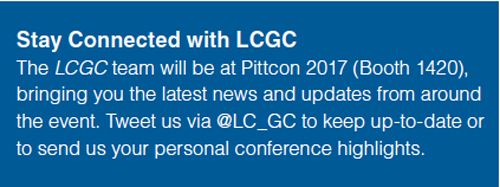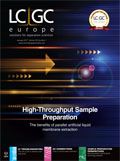Pittcon 2017 Hits Chicago
A glimpse of what’s on offer for chromatographers at Pittcon 2017, which will be held from 5–9 March 2017 at McCormick Place in Chicago, Illinois, USA.
Photo Credit: marchello74/Shutterstock.com

Marian Nardozzi, The Pittsburgh Conference, Pennsylvania, USA
A glimpse of what’s on offer for chromatographers at Pittcon 2017, which will be held from 5–9 March 2017 at McCormick Place in Chicago, Illinois, USA.
Pittcon 2017 will be held at McCormick Place in Chicago, Illinois, USA, from the 5 March until the 9 March 2017. Chicago is more than just a big city. Besides its striking downtown, which includes some of the tallest buildings in the world, it has a distinctive coastline, hundreds of vibrant parks, and 77 unique neighbourhoods. This truly distinguishing mix of global attractions and local charm make it one epic city.
Pittcon 2017 is shaping up to deliver an exciting, educational, and highly productive event. Leading companies from more than 30 countries will offer a world-class exposition that will showcase the latest chromatographic and ancillary equipment. The technical program and short courses will provide a unique chance to learn about the latest chromatographic techniques and research from prominent scientists in fields including biomedical, environmental, genomics and proteomics, fuels and energy, analytical chemistry, materials science, food science, pharmaceuticals, polymers and plastics, QA and QC, water and wastewater, and more.
New this year will be the Magnificent Mile that runs the entire length of the hall. This area will be dedicated to entertaining activities, our first ever Lab Gauntlet - which is a series of laboratory challenges for the participant to successfully complete - food vendors, information of interest, relaxation areas, massage stations, giveaways, award ceremonies, and many other exciting events.
The Live Demos will be returning for a second year. Attendees are invited to participate in interactive product presentations from companies in a dedicated area covering such topics as air monitoring and new techniques in food, water, and pharmaceutical testing, as well as products to increase laboratory efficiency and recent developments in spectroscopy, laboratory procedures, sampling, and analytical techniques.
Technical Programme
To complement the exposition, a robust technical programme will be presented by world-renowned scientists. Sessions will include topics related to liquid and gas chromatography in a wide range of applications.
The following is a sample of the programme highlights:
- Frontiers in Metabolomics: Analytical Challenges and Advances: Coral Barbas and Joanne Godzien of Universidad San Pablo CEU (Spain) will discuss solutions to challenges using vial extraction of minute amounts of sample to expand the amount of information that can be obtained.
- The Power of Column Technology in Liquid Chromatography: Peter W. Carr of the University of Minnesota (USA) and Dwight R. Stoll of the Gustavus Adolphis College (USA) compare the precision of one-dimensional liquid chromatography (1D LC) and two-dimensional LC (2D LC) and how to use open loops for improved sampling results.
- UHPLC Method Development in Pharmaceutical Analysis: Michael Dong from MWD Consulting will focus on the development of new chemical entities (NCEs) with high chemical and chiral purities, which are a regulatory expectation in new drug development.
- Accurate Mass Analysis of Organic Contaminants in Food and Water: Imma Ferrer and Michael Thurman of the University of Colorado (USA) will review the most innovative strategies using liquid chromatography time-of-flight mass spectrometry techniques applied to environmental contaminant identification.
- Integration of Liquid Chromatography and Mass Spectrometry in Proteomics: Ying Ge from the University of Wisconsin-Madison (USA) will highlight the development of a new size-exclusion chromatography (SEC) strategy coupled with hydrophobic interaction chromatography (HIC), ion-exchange chromatography (IEC), and reversed phase chromatography to achieve a deep proteome profiling. These multidimensional LC (MDLC) strategies can be applied to decipher the proteoforms in the human heart proteome.
- How Did That Get in My Food? Determination of Process Induced Food Contaminants: Michael Granvogl from the TU Munich (Germany) will address the challenges that can arise when lowering the amounts of undesirable compounds, while maintaining an overall aroma well accepted by the consumers.
- ACS-DAC - Advances in Biomolecule Quantitation by Mass Spectrometry: Andy Hoofnagle of the University of Washington (USA) will discuss the development of a multiplexed assay for the quantification of vitamin D metabolites in serum and plasma that uses immunoaffinity purification to enrich for specific molecules of interest. In addition, the development of a targeted proteomics assay that quantifies serum and plasma concentrations of vitamin D binding globulin and identifies an individual’s genotype will be discussed.
Pittcon 2017 Award Symposia
An important feature of Pittcon is to recognize and honour those who have made outstanding contributions to analytical chemistry and applied spectroscopy.
For the third year, the LCGC awards will be presented at Pittcon. The 2017 LCGC Lifetime Achievement in Chromatography Award will be given to Pat Sandra of the Research Institute for Chromatography (Belgium), and the 2017 LCGC Emerging Leader in Chromatography Award will be presented to Deirdre Cabooter of the University of Leuven (Belgium). Talks in that session will include: Evolution of Peak Capacity in Liquid Chromatography; Capillary LC with Sub-2âμm Particles: Effects of Column Packing Conditions on Column Morphology and Efficiency; High-Resolution Capillary LC–MS/MS in Structural Elucidation and Measurements of Biologically Important Glycans; Selectivity and Efficiency in Liquid Chromatography: How to Get the Best of Both Worlds; and Some Speculations on the Ideal Chromatography System: Quo Vadis HPLC?
András Guttman, director of the Horváth Csaba Laboratory of Bioseparation Sciences at the University of Debrecen (Hungary) and MTA-PE Lendulet Professorship in Translational Glycomics, will be awarded the 2017 Chromatography Forum of the Delaware Valley Dal Nogare Award. An awardee is chosen on the basis of his or her contributions to the fundamental understanding of the chromatographic process. Guttman is being recognized for his contributions to the theory and application of separation science in capillary electrophoretic separations of biomolecules such as glycoproteins, carbohydrates, oligosaccharides, and glycans. Organized by Mary Ellen McNally from EI DuPont de Nemours and Company, this session will include the following presentations:
- Application of Separation-Mass Spectrometry to Biotechnology, Barry L. Karger of Northeastern University (USA)
- Porous Polymer-Based Monolithic Columns - 25 Years Old and Still Growing, Frantisek Svec from The Molecular Foundry, LBNL (USA)
- Capillary Electrophoresis/Laser-Induced Fluorescence Detection: Then and Now, Milos V. Novotny of Indiana University (USA)
- Mapping Dynamic Protein Interaction Landscapes in Saccharomyces Cerevisiae Using a Novel Whole Network Enrichment Approach, John R. Yates from The Scripps Research Institute (USA).
This year’s Wallace H. Coulter Lecture will be delivered by Karl Deisseroth, the D.H. Chen Professor of Bioengineering and of Psychiatry and Behavioral Sciences at Stanford University, and Investigator of the Howard Hughes Medical Institute. Over a period of less than 12 years, his laboratory created and developed both optogenetics and CLARITY. He has also used his technologies to discover the neural cell types and connections that cause adaptive and maladaptive behaviours, and has disseminated the technologies to thousands of laboratories around the world.
Professional Development
The Pittcon short course programme will offer more than 40 courses covering topics relevant to gas chromatography (GC) and LC. Taught by leading experts in their field, these classes range from beginner to intermediate to advanced levels in half-day up to twoâday sessions. These short courses are suitable for the seasoned professional, the recent graduate, or the researcher interested in learning a new skill set.
The following is a sample of short course titles:
- Advanced HPLC/UHPLC 1: Fundamentals, an advanced one-day course taught by Michael Dong of MWD Consulting
- Introduction to Two-Dimensional Liquid Chromatography, a one-day intermediate course taught by Dwight Stoll from Gustavus Adolphus College
- Highly Successful Strategies for LC–MS Quantitation: Current Applications and Emerging Technologies, a one-day beginner course taught by Rick King from PharmaCadence Analytical Services, LLC.
Networking Sessions
The conferee networking sessions provide an opportunity to network with colleagues from around the world. These sessions begin on Sunday and are open to all full conferee registrations. These informal sessions will appeal to attendees with similar interests to meet and discuss a specific topic in a wide range of disciplines.
Pittcon Mobile App
Pittcon’s mobile app is available for free download for iOS and Android mobile devices. It provides complete details about exhibitors, live demos, technical sessions, short courses, conferee networking, and gives access to maps and local Chicago dining and nightlife. Users are now able to create an agenda, which will sync across devices and Pittcon at a Glance, which is the web version.
Contact: Marian Nardozzi
E-mail: publicity@pittcon.org
Location: McCormick Place, West Hall, Chicago, Illinois, USA
Tel: +1 412 825 3220 x 203
Fax: +1 412 825 3224
Registration: www.pittcon.org/register


Analysis of PFAS in Milk by LC-MS/MS
May 15th 2025Dairy milk is one commodity that can be impacted by environmental contaminants, such as PFAS, so it is important to implement extensive, robust, and accurate testing. In this work, a sensitive and reliable method was developed for the analysis of PFAS in milk by LC-MS/MS at levels as low as 0.01 µg/kg.

.png&w=3840&q=75)

.png&w=3840&q=75)



.png&w=3840&q=75)



.png&w=3840&q=75)












